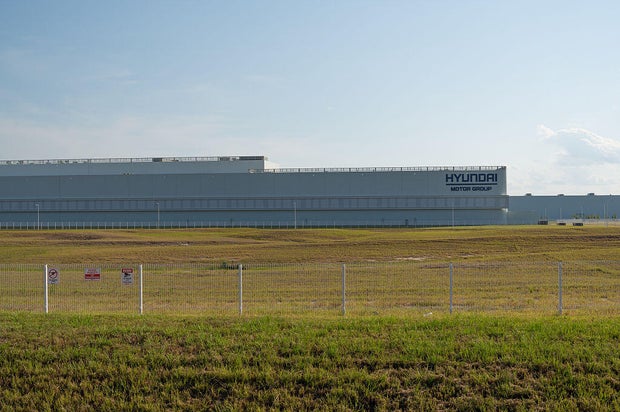In an extensive operation executed on a grand scale at Hyundai’s significant facility in Georgia this Thursday, a staggering 475 immigrants, suspected to be residing and working in the United States without proper documentation, were apprehended by federal agents. This announcement was made public by federal authorities who informed that the operation was part of a focused enforcement effort against illegal immigration.
Steven Schrank, who holds the position of special agent in charge of Homeland Security Investigations for Georgia and Alabama, addressed the media on Friday. He shared that a large number of those detained were Korean nationals, though specific figures were unclear at the time. The detained individuals were employed across various companies operating within the Hyundai facility, including some subcontractors.
The South Korean Foreign Minister, Cho Hyun, on Saturday, disclosed to the press that among the detained, over 300 were South Korean nationals. This significant number highlights the operation’s large scale and its impact on the Korean community.
During the press conference that followed on Friday, it was noted that no criminal charges had yet been laid out. The operation was part of a month-long investigation into allegations of unlawful employment practices among other federal offenses. Schrank expressed that this particular raid marked the largest enforcement operation at a single site in the operational history of Homeland Security Investigations, a division of the U.S. Immigration and Customs Enforcement.
Schrank emphasized the raid’s intent, stating, “This operation underscores our commitment to protecting jobs for Georgians and Americans, ensuring a level playing field for businesses that comply with the law, safeguarding the integrity of our economy, and protecting workers from exploitation.”
He further detailed that among those detained, some had allegedly entered the U.S. illegally, while others were accused of overstaying their visas or violating the conditions of their visa waivers by engaging in unauthorized employment. The majority of these detainees were transferred to an ICE facility in Folkston, Georgia, which is near the Florida-Georgia state line. Schrank mentioned their subsequent movements would depend on individual circumstances of each case.
ICE elaborated in a statement issued Friday night that all the individuals apprehended were found to be working in violation of the terms of their visas and/or their statuses. There was also mention of a green card holder from Mexico who was arrested after it was determined that he was removable from the U.S. based on multiple criminal convictions.
Schrank, in his statement included in the ICE release, affirmed that the operation “sends a clear message that those who exploit the system and undermine our workforce will be held accountable.” He continued to extend a welcoming hand to companies investing in the U.S., affirming that bringing in workers for projects was acceptable, provided it adhered to legal protocols.
The local response was tinged with criticism, as Yvonne Brooks, president of Georgia’s chapter of the AFL-CIO, labeled the raid as politically motivated. Brooks argued that such operations only serve to instill fear among workers and their families, thereby escalating the burden on their coworkers and fostering a hostile working environment.
This raid was a coordinated effort involving multiple federal agencies, reflecting the comprehensive nature of the current administration’s strategies towards curbing illegal immigration. These agencies included not only ICE but also the Border Patrol, FBI, Drug Enforcement Administration, IRS, and the Bureau of Alcohol, Tobacco, Firearms, and Explosives, thus highlighting the federal government’s rigorous approach to this issue.
The operation took place at one of Georgia’s largest and most highlighted manufacturing sites, notably championed by Governor Brian Kemp and other state officials as a significant economic development project. Hyundai Motor Group, which is South Korea’s largest car manufacturer, began producing electric vehicles at this new $7.6 billion plant approximately a year ago. The facility, which currently employs around 1,200 workers, is also preparing to expand with an adjacent battery plant in collaboration with LG Energy Solution, anticipated to open the following year. However, the enforcement action temporarily halted construction on the battery plant.
Hyundai Motor Company soon responded, asserting its commitment to legal compliances and indicating ongoing evaluations to ensure all partners and contractors adhere to similar standards. Meanwhile, LG issued a statement prioritizing the safety and well-being of its employees and affirmed its cooperation with relevant authorities.
The broad implications of this operation stretch beyond immediate legal concerns, touching on international relations, worker rights, local economic impacts, and broader immigration policy debates, thus reinforcing its significance in the broader narrative of immigration enforcement within the United States.









